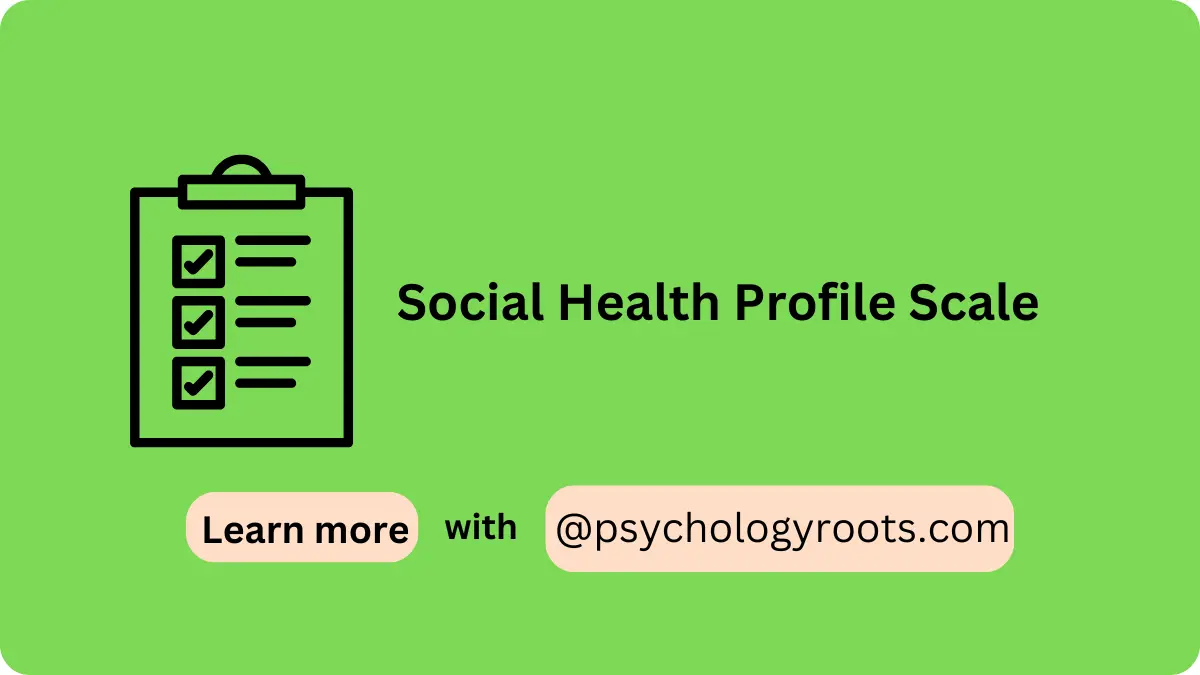Table of Contents
Social Health Profile Scale
Here in this post, we are sharing the “Social Health Profile Scale”. You can read psychometric and Author information. We have thousands of Scales and questionnaires in our collection (See Scales and Questionnaires). You can demand us any scale and questionnaires related to psychology through our community, and we will provide you with a short time. Keep visiting Psychology Roots.
About Social Health Profile Scale
Scale Name
Social Health Profile Scale
Author Details
Lila Werthamer-Larsson, Sheppard G. Kellam, and Luanne Wheeler
Translation Availability
English

Background/Description
The Social Health Profile Scale, developed by Lila Werthamer-Larsson, Sheppard G. Kellam, and Luanne Wheeler in 1991, is a teacher-report questionnaire designed to measure teachers’ perceptions of children’s concentration skills among urban elementary school children in grades 1-6 (ages 6-12). Used within the context of the Teacher Observation of Classroom Adaptation-Revised (TOCA-R) framework, the scale is part of a broader effort to assess classroom adaptation and social-emotional functioning in low-income, urban school settings. Grounded in developmental epidemiology and ecological systems theory (Bronfenbrenner, 1979), it evaluates how well children focus on tasks, a key indicator of academic and behavioral adjustment. The scale was employed in studies like the Johns Hopkins Preventive Intervention Research Center’s trials to identify risk factors for later problem behaviors (Werthamer-Larsson et al., 1991).
The scale includes items (exact number not specified, likely 4-6 within the TOCA-R concentration problems subscale) rated on a 6-point Likert scale (1 = “almost never” to 6 = “almost always”), assessing behaviors such as difficulty sustaining attention or completing tasks (e.g., “Has trouble concentrating” or “Easily distracted”). Higher scores indicate greater teacher-perceived concentration difficulties. Validated in urban, low-income school samples, it is used to screen for attention-related issues and inform early interventions.
Psychologists, educators, and public health researchers use the scale to assess concentration as a protective or risk factor, evaluate classroom interventions, and study links to outcomes like academic failure or aggression. Its teacher-report format and urban focus are strengths, but its English-only availability, limited psychometric data, and reliance on teacher perceptions may limit generalizability.
Administration, Scoring and Interpretation
- Obtain a copy of the Social Health Profile Scale or TOCA-R from primary sources, such as Werthamer-Larsson et al. (1991) or Dahlberg et al. (2005) Measuring Violence-Related Attitudes, Behaviors, and Influences Among Youths (p. 122, available at http://www.cdc.gov/violenceprevention/pdf/YV_Compendium.pdf), ensuring ethical use permissions.
- Explain the purpose to teachers, noting that it assesses students’ concentration skills to support academic and behavioral growth, emphasizing confidentiality and clarity.
- Provide instructions, asking teachers to rate each item based on their observations of a student’s concentration behaviors over a specified period (e.g., past month), using the 6-point scale.
- Approximate time for completion is 2-3 minutes per student, depending on the number of items.
- Administer in a school or research setting, using paper or digital formats, ensuring a private environment for teacher responses. Training on objective rating may enhance accuracy.
Reliability and Validity
Specific psychometric properties for the Social Health Profile Scale are not detailed in available sources, including Werthamer-Larsson et al. (1991) or Dahlberg et al. (2005). Internal consistency, test-retest reliability, and validity metrics are not reported, likely due to the scale’s integration within the broader TOCA-R, which has established reliability (e.g., α ≈ 0.80-0.90 for concentration problems subscale in related studies). The lack of standalone data limits evaluation of the scale’s performance.
Convergent validity is inferred from the TOCA-R’s correlations with related constructs, such as attention-deficit/hyperactivity disorder (ADHD) symptoms (r ≈ 0.40-0.60) and academic difficulties. Discriminant validity is suggested by weaker correlations with unrelated constructs, like social skills. Criterion validity is supported by its use in predicting long-term outcomes, such as substance use or delinquency, in longitudinal studies (Werthamer-Larsson et al., 1991). Factor analyses within the TOCA-R confirm a concentration problems factor, supporting construct validity. Due to missing psychometric data, the scale should be used cautiously, ideally within the TOCA-R framework and with multi-informant data.
Available Versions
10-Items
Reference
Werthamer-Larsson, L., Kellam, S., & Wheeler, L. (1991). Effect of first‐grade classroom environment on shy behavior, aggressive behavior, and concentration problems. American journal of community psychology, 19(4), 585-602.
Dahlberg, L. L., Toal, S. B., Swahn, M. H., & Behrens, C. B. (2005). Measuring violence-related attitudes, behaviors, and influences among youths: A compendium of assessment tools. Centers for disease control and prevention.
Important Link
Scale File:
Frequently Asked Questions
What does the Social Health Profile Scale measure?
It measures teachers’ perceptions of children’s concentration skills.
Who can use the scale?
Psychologists, educators, and researchers studying urban elementary students.
How long does the scale take to complete?
It takes about 2-3 minutes per student.
Is the scale specific to urban students?
Yes, it targets grades 1-6 in low-income urban schools.
Can the scale inform interventions?
Yes, but missing psychometric data requires cautious use within TOCA-R.
Disclaimer
Please note that Psychology Roots does not have the right to grant permission for the use of any psychological scales or assessments listed on its website. To use any scale or assessment, you must obtain permission directly from the author or translator of the tool. Psychology Roots provides information about various tools and their administration procedures, but it is your responsibility to obtain proper permissions before using any scale or assessment. If you need further information about an author’s contact details, please submit a query to the Psychology Roots team.
Help Us Improve This Article
Have you discovered an inaccuracy? We put out great effort to give accurate and scientifically trustworthy information to our readers. Please notify us if you discover any typographical or grammatical errors.
Make a comment. We acknowledge and appreciate your efforts.
Share With Us
If you have any scale or any material related to psychology kindly share it with us at psychologyroots@gmail.com. We help others on behalf of you.